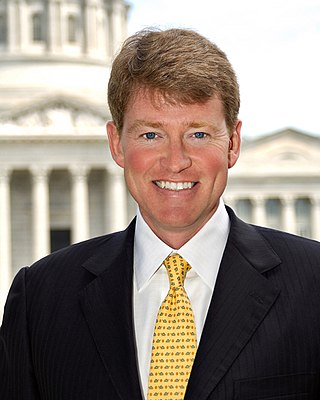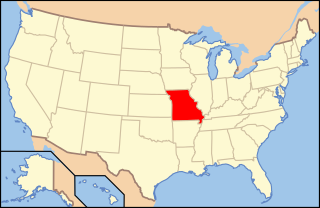
St. Louis County is located in the eastern-central portion of Missouri. It is bounded by the City of St. Louis and the Mississippi River to the east, the Missouri River to the north, and the Meramec River to the south. At the 2020 census, the total population was 1,004,125, making it the most populous county in Missouri. Its county seat is Clayton. The county is included in the St. Louis, MO–IL metropolitan statistical area.

Macks Creek is an unincorporated community and census-designated place in southwest Camden County, Missouri, United States. The population was 244 at the 2010 census.

Ferguson is a city in St. Louis County, Missouri, United States. It is part of the Greater St. Louis metropolitan area. Per the 2020 census, the population was 18,527, and predominantly black.

Pagedale is a city in St. Louis County, Missouri, United States. The population was 3,310 at the 2010 census.

Linndale is the smallest village in Cuyahoga County, Ohio, United States. It is landlocked, surrounded by the city of Cleveland and the suburb of Brooklyn. According to the 2020 census, the population was 108.

Peter Dickson Kinder is an American lawyer and politician who served as the 46th Lieutenant Governor of Missouri from 2005 to 2017. He was appointed as a co-chairman of the Delta Regional Authority in August 2017, serving in that post until he resigned in June 2018.

Christopher Andrew Koster is an American lawyer and politician who served as the 41st Attorney General of Missouri from 2009 to 2017. Before that, Koster was elected three times as prosecuting attorney of Cass County, Missouri, and served four years as State Senator from Missouri's 31st Senatorial district.

On February 7, 2008, a gunman went on a shooting rampage at a public meeting in the city hall, leaving six people dead and a seventh injured in Kirkwood, Missouri, a suburb of St. Louis. Charles Lee "Cookie" Thornton, aged 52, shot one police officer with a revolver across the side street from city hall and took the officer's handgun before entering city hall. Thornton reached council chambers with these two pistols shortly after the meeting began. There, he shot a police officer, the public works director, two council members, the mayor, and a reporter. The shooter died from two gunshot wounds in a shootout with police.

Eric Stephen Schmitt is an American lawyer and politician serving as the junior United States senator from Missouri since 2023. A member of the Republican Party, Schmitt served as a Missouri state senator from 2009 to 2017, as Missouri state treasurer from 2017 to 2019, and as the Missouri attorney general from 2019 to 2023.
Theodore Hoskins, also referred to as Ted Hoskins, is an American politician with the Democratic Party. He was a member of the Missouri House of Representatives and has been mayor of Berkeley, Missouri since his election in 2012. Hoskins was born in St. Louis, Missouri, and raised in Berkeley, Missouri. He served in the United States Air Force from 1956 to 1961, and left with an honorable discharge. He received education in business administration at Florissant Valley Community College, where he obtained an associate's degree, and at the University of Missouri-St. Louis. He is married with three children, and resides in Berkeley, Missouri. Hoskins has worked in a financial capacity with Bi-State Development Agency, and is owner and CEO of T & L Automated Accounting Services.

The Ferguson Missouri Police Department (FPD) is a law enforcement agency serving Ferguson, Missouri. Since March 14, 2023, the Current Chief of Police is Troy Doyle

Michael Lynn Parson is an American politician serving as the 57th governor of Missouri since 2018. A member of the Republican Party, Parson assumed the governorship when Eric Greitens resigned, as he was lieutenant governor at the time. Parson served the remainder of Greitens's term and was elected governor in his own right in 2020.

Lesbian, gay, bisexual, transgender, and queer (LGBTQ) persons in the U.S. state of Missouri face some legal challenges not experienced by other residents throughout the state, excluding St. Louis, Kansas City, and Columbia. Same-sex sexual activity is legal in Missouri.
The Judiciary of New Jersey comprises the New Jersey Supreme Court as the state supreme court and many lower courts.
Same-sex marriage has been legal in Missouri since the U.S. Supreme Court's landmark ruling in Obergefell v. Hodges, which struck down state bans on marriages between two people of the same sex on June 26, 2015. Prior to the court ruling, the state recognized same-sex marriages from other jurisdictions pursuant to a state court ruling in October 2014, and certain jurisdictions of the state performed same-sex marriage despite a statewide ban.

The 2016 Missouri Attorney General election was held on November 8, 2016, to elect the Attorney General of Missouri, concurrently with the 2016 U.S. presidential election, as well as elections to the United States Senate and elections to the United States House of Representatives and various state and local elections. Republican Josh Hawley defeated the Democratic nominee Teresa Hensley.
Kimberly M. Gardner is an American politician and attorney from the state of Missouri. She was the circuit attorney for the city of St. Louis, Missouri. She previously served as a member of the Missouri House of Representatives.

Wesley Bell is an American attorney, former public defender, former municipal prosecutor and judge, former municipal prosecutor and former city council member for Ferguson, Missouri. Currently, Bell holds the office of Prosecuting Attorney for St. Louis County, Missouri. In a major upset, he soundly defeated long-time yet controversial county prosecutor Bob McCulloch in the August 2018 Democratic primary election. Bell became the first black county prosecuting attorney in St. Louis County history when he took office in January 2019.

2022 Missouri legalization initiative was a voter initiative on the November 2022 ballot. It was approved by voters, legalizing cannabis in the U.S. state of Missouri.
Andrew Bailey is an American attorney and politician who currently serves as the Missouri Attorney General, an office he was appointed to in January 2023.

















